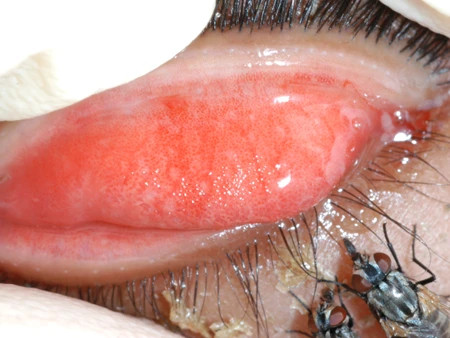Definition
Sexually transmitted infections (STIs) are infections that are transmitted from person to person through sexual contact or intercourse, either through the genitals, mouth, or anus. Bacteria, viruses, and parasites that cause sexually transmitted infections can be transmitted through blood, semen, vagina, or other body fluids. Sometimes, these infections can be transmitted non-sexually, such as from mother to baby through pregnancy, childbirth, skin contact, or through blood transfusions and shared needles.
There are various types of sexually transmitted infections, including:
- Gonorrhea
- Chlamydia
- HIV/AIDS
- Syphilis
- Genital warts
- HPV infection
- Hepatitis B
- Genital herpes simplex
- Trichomoniasis
- Bacterial vaginosis
The problem of sexually transmitted infections does not only affect health in Indonesia. According to the World Health Organization (WHO), more than 1 million people are infected with sexually transmitted infections every day. Sometimes, many Indonesians still consider sexually transmitted infections to be taboo. In fact, many sexually transmitted infections can actually be prevented and treated.
Causes
The causes of sexually transmitted infections are divided into three, namely:
Bacteria
- Gonorrhea (Neiserria gonorrhoeae)
- Syphilis (Treponema pallidum)
- Chlamydia (Chlamydia trachomatis)
Virus
- HPV (Human Papilloma Virus) causes genital warts
- Genital herpes (herpes simplex virus)
- HIV (Human Immunodeficiency Virus)
Parasites
- Trichomoniasis is an example of a sexually transmitted infection caused by the parasite Trichomonas vaginalis.
Risk factor
Everyone who is sexually active is at risk of contracting sexually transmitted infections. The following are factors that can increase a person's risk of contracting STIs, such as:
- Unprotected sex (condoms)
- Sex with multiple partners
- History of previous sexually transmitted infections
- History of alcohol or drug abuse
- History of sharing needles
- Weak immune system (immunocompromised)
- Ages 15–24 years
- Men who have sex with men (MSM)
Symptoms
Symptoms of sexually transmitted infections vary, and some types of sexually transmitted infections have very mild symptoms that are sometimes not felt by the patient. Sexually transmitted infections can cause symptoms such as the following:
- Discharge or unusual, hot, or foul-smelling fluid from the penis or vagina
- Pain and warts in the genital area
- Pain when urinating or increased frequency of urination
- Pain during sexual intercourse
- A lump in the groin area, whether painful or not
- A rash on the genitals, hands, or feet
- Itching and redness in the genital area
- The presence of sores in the genital area
- Fever
- Abdominal pain
Diagnosis
The doctor will conduct a thorough examination to diagnose sexually transmitted infections. The examinations include a patient interview session, physical examination, and supporting examinations.
Medical Interview
The doctor will ask about the patient's main complaint and other accompanying complaints. The doctor can also ask quite personal questions to explore risk factors related to sexually transmitted infections, such as:
- History of sexual intercourse and sexual behavior
- Use of condoms
- History of changing partners
In addition, the doctor will also ask about the patient's medical history, history of previous sexually transmitted infections, history of disease in the family, and the treatment that the patient has undergone to overcome their complaints.
Physical Examination
Next, the doctor will conduct a physical examination in a room with bright lights. The doctor will ask the patient's permission to open their pants and take action professionally. The doctor will inspect the genitals to see if there are lumps, rashes, wounds, duh, or warts on the genitals. After that, the doctor will perform an examination, such as pressing for signs of inflammation or infection, such as pain, a warm temperature, or redness on the lump or wound.
Supporting Examination
The doctor will decide whether a supporting examination is necessary for the patient. The examinations that can be done are:
- Blood test
- Urine test
- Sexual fluid smear test
Bood or urine tests can be used to detect diseases such as HIV, hepatitis, gonorrhea, herpes, and syphilis. If you have a sexually transmitted infection that has symptoms of abnormal discharge from the genitals, the doctor will take fluid with an applicator, such as cotton from your genitals. Then, the smear of this fluid will be examined under a laboratory microscope to determine the type of bacteria, virus, or parasite causing the infection.
Management
The treatment given will be adjusted to the cause of the infection. If you are pregnant, then treatment must be carried out immediately because sexually transmitted infections can affect the development of the fetus. These drugs cannot be purchased freely and must be purchased under a prescription and require supervision from a doctor.
Antibiotics and Antiparasitics
Antibiotics can be used to treat sexually transmitted infections caused by bacteria, such as gonorrhea or chlamydia. Meanwhile, antiparasitics are given for infections caused by parasites, such as trichomoniasis. If you are given antibiotics by your doctor, then this medicine must be taken as directed until finished to prevent antibiotic resistance. In addition, you should also avoid sexual intercourse during the treatment process to reduce possible relapses.
Antivirals
Doctors can also prescribe antiviral drugs to treat infections caused by viruses, such as herpes or HIV. Especially for HIV, because this disease cannot be cured and can only be controlled by its symptoms, it is essential for patients to have regular check-ups with their doctors. HIV patients must check their bodies' virus levels and take antiviral drugs regularly. The sooner you seek treatment, the more effective the treatment will be.
Complications
Because many people do not have symptoms in the early stages of sexually transmitted infections, screening for sexually transmitted infections is important to prevent complications. Complications that arise vary, ranging from mild to severe complications, including:
- Pelvic pain
- Pregnancy complications (if sexually transmitted infections occur in pregnant women)
- Eye inflammation
- Arthritis
- Pelvic inflammation
- Infertility disorders
- Some types of cancer, such as cervical cancer and anal cancer
Prevention
When used properly and correctly, condoms can be an effective contraceptive to prevent sexually transmitted infections, including HIV. When possible, condoms should be used during all sexual intercourse.
In addition, two effective vaccines are available to prevent sexually transmitted infections caused by viruses, namely the hepatitis B vaccine and HPV. These vaccines have provided effective benefits in preventing sexually transmitted infections. HPV vaccination can prevent deaths of women worldwide from cervical cancer, especially in low- and middle-income countries. HPV vaccination should be given to girls aged 11 to 15 years.
Counseling and education about genitals and sexual relations in adolescents is also an effective way to prevent sexually transmitted infections. Providing education about sexual relations and healthy relationships by:
- Not changing partners
- Maintaining genital hygiene
- Avoiding alcohol and drugs
- Get yourself tested for sexually transmitted infections if you feel you have risk factors
When to see a doctor?
You should see a doctor immediately if you experience symptoms of sexually transmitted infections and feel you have risk factors for sexually transmitted infections. Good screening can improve the healing process so that healing time can be completed faster. You can go to a general practitioner at the nearest health center or clinic or to a dermatologist and venereologist. Especially for pregnant women, you should consult your risk factors for sexually transmitted infections as soon as possible with an obstetrician.
Looking for more information about other diseases? Click here!
- dr. Yuliana Inosensia
Mayoclinic - Sexually Transmitted Diseases (STD). (2021). Retrieved 28 July 2022 from https://www.mayoclinic.org/diseases-conditions/sexually-transmitted-diseases-stds/symptoms-causes/syc-20351240
Panduan Praktik Klinis Bagi Dokter Spesialis Kulit dan Kelamin di Indonesia – PERDOSKI. (2017). Retrieved 28 July 2022 from https://perdoski.id/uploads/original/2017/10/PPKPERDOSKI2017.pdf
Verywellhealth – Sexually Transmitted Diseases. (2021). Retrieved 28 July 2022 from https://www.verywellhealth.com/std-overview-4581893
World Health Organization – Sexually Transmitted Infections (STIs). (2021). Retrieved 28 July 2022 from https://www.who.int/news-room/fact-sheets/detail/sexually-transmitted-infections-(stis)












